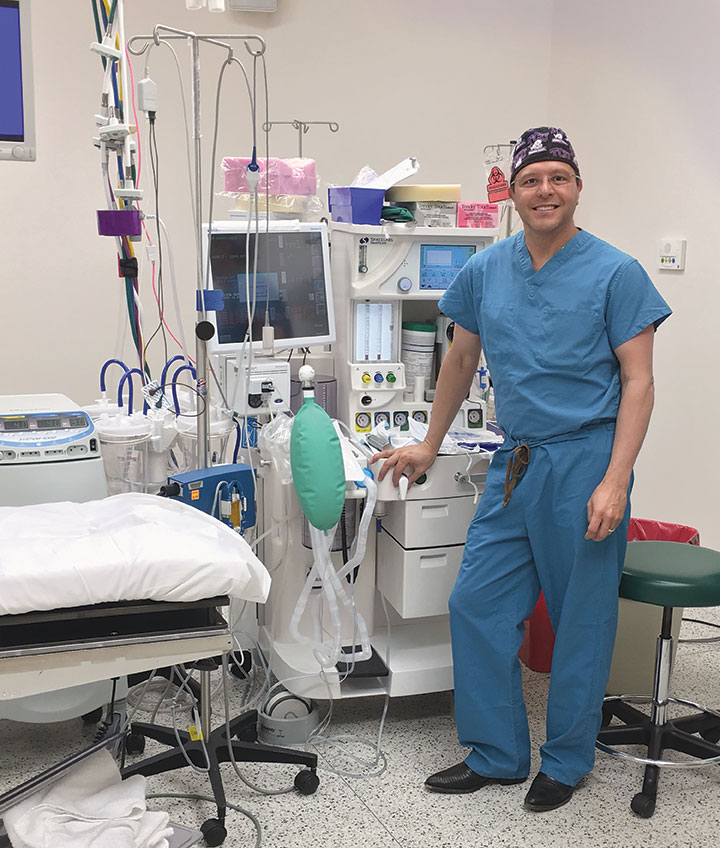Juan Quintana is President of the American Association of Nurse Anesthetists
The ’09 DNP graduate gives a voice to more than 49,000 certified nurse anesthetists and is championing improved health care for veterans.

Juan Quintana (courtesy photo).
Juan Quintana is President of the American Association of Nurse Anesthetists
The ’09 DNP graduate gives a voice to more than 49,000 certified nurse anesthetists and is championing improved health care for veterans.
As the 2015-16 president of the American Association of Nurse Anesthetists, Juan Quintana ’09 DNP is providing a voice for more than 49,000 Certified Registered Nurse Anesthetists across the country, as well as championing patient causes — namely better access to care for veterans.
As the organization’s first Hispanic leader, he’s also paving the way for others to follow.
“One of the things that the TCU DNP helped me do was recognize health care policy changes, how I could be a change agent.”
Juan Quintana
“I’m obviously very proud of my heritage and being Hispanic. I think it’s big for all of us to recognize that we’re a diverse group of folks and that increasingly we’re going to begin to see a more diverse group of [nurse anesthetists] coming,” he said. “What I like about being the first Hispanic president is it gives folks who are Hispanic or are of a minority-specific grouping the chance to see that, ‘Hey, if Juan can do it, then I can do it.’ And they feel like there’s a chance for them to also move up and be excited about what they do.”
Path to the Nursing Profession
Quintana always wanted to take care of people. Frustrated as a biochemistry major, he ventured into nursing and found the hands-on work rewarding. Later, he enjoyed the complexity of patient care as an intensive care unit nurse, but he wanted to do more for his patients.
After exploring advanced degrees, he set his sights on becoming a Certified Registered Nurse Anesthetist — a specialty practice that provides anesthesia and pain management services. Professionals in this field safely administer approximately 40 million anesthetics to patients each year in the U.S., and in rural areas, they are the primary providers of anesthesia.
After about a year of working in his new field, Quintana saw an opportunity to go into business on his own, founding Sleepy Anesthesia Associates in 1999.
“It was a little bit risky,” he admits. “I had a little bit of fear going in, but it’s about being willing to take a little bit of risk, mitigate that risk as much as possible and then jumping in.”
Today, his practice has seven employees and provides services at three hospitals and two ambulatory surgery centers in rural Northeast Texas. (Many TCU nurse anesthesia students participate in rural clinical rotations at his practice.)
When Quintana heard about TCU’s Doctor of Nursing Practice program, he loved the idea of collaborating with other advanced practice registered nurses. Plus the degree is a practice doctorate, he notes.
“What that means primarily is it helps you enhance your practice. There’s a lot of evidence available to us, but sometimes health care takes a little bit longer to assimilate new evidence and get it into the system. The DNP perspective helps us take that evidence we find out there and evaluate it and determine if it’s good research — because there’s a lot of research that just kind of teeters on the edge of not so hot — and then move it from that big cloud of evidence in the sky down to the bedside where it has a real practical value.
Leading the American Association of Nurse Anesthetists
The perspective has also helped in his presidency.
“As president one of the things that the TCU DNP helped me do was recognize health care policy changes, how I could be a change agent in that health care policy realm, how I could influence decisions and hopefully motivate change for the betterment of health care,” says Quintana, who is also a former president of the Texas Association of Nurse Anesthetists.
Under his leadership the organization has been working hard to eliminate barriers to care — including services for veterans.
“The Veterans Health Administration is trying to make some changes, and we are encouraging those changes, to allow CRNAs to practice to the full practice authority — that is the top of their education level. Sometimes we educate folks to do things and then we find certain areas of the country where they’re not permitted to do all those. That makes no sense, especially in places where veterans can’t get access to care, and so that’s why we really have pushed for veterans health and promoting full practice authority for APRNs and CRNAs.”
Under his leadership, the organization is also reaching out to health care administrators, legislators and regulators to explain how certified nurse anesthetists can benefit the health care system.
“Today, the health care environment is changing so rapidly that we need providers who can flex with it, who can adjust for the needs,” he says. “CRNAs are very optimized to meet those needs.”

Your comments are welcome
Comments
Related Reading:
Alumni
A Legacy of Joy
Tammy Krause’s Bags of Fun honor her daughter’s memory.
Alumni
Driven to Succeed
Carlos Treadway, executive vice president international of Ford Credit, takes a relationship-based approach to financing.